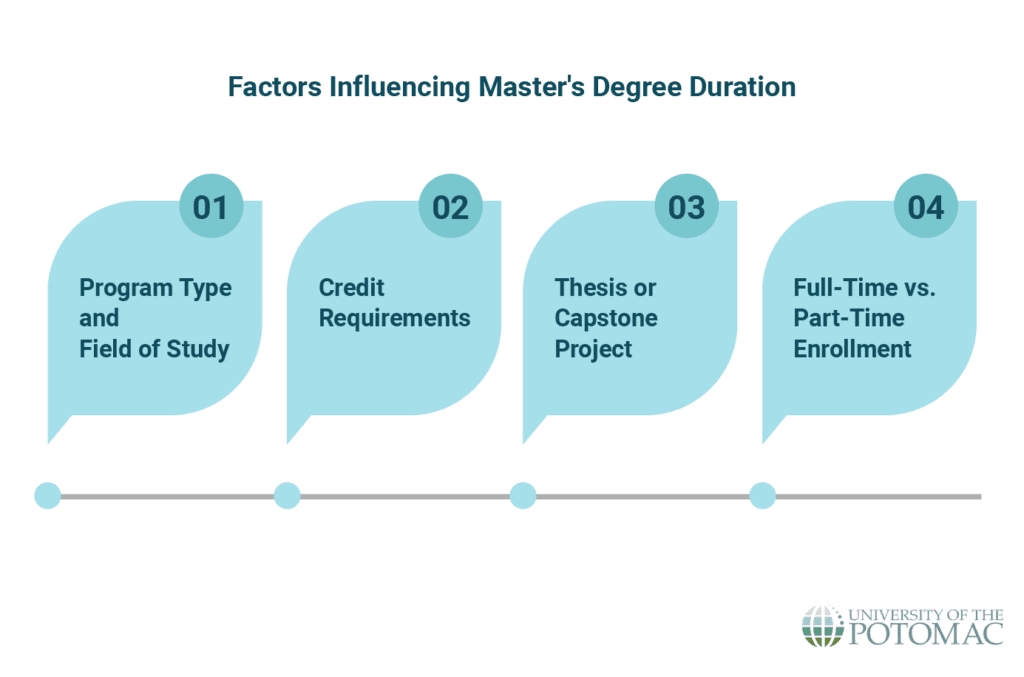Bachelor’s degrees serve as the initial stepping stone in higher education toward one’s desired profession; however, it is the pursuit of a Master’s degree that helps students deepen their knowledge and expertise in any chosen field. This advanced degree significantly increases career prospects by opening doors to more opportunities for higher-level positions and specialized roles. Moreover, with industries evolving rapidly, an advanced degree, in addition to a bachelor’s degree, can equip students with adaptable skills to navigate a dynamic job market and contribute significantly to their respective fields.
The prospect of dedicating additional time and energy to more schooling can seem daunting, especially when one is eager to enter the professional world or take a break from formal education. So, read on as we explore the crucial question of “How long does it take to get a Master’s degree?” and go through the factors that can shorten or increase the duration of your Master’s degree journey.
Standard Duration for Different Master’s Programs
Generally, Master’s programs last from one to three years, with the exact duration depending on the program you choose. Different fields have different demands — some require more coursework, research, and practical experience, whereas others have a more direct approach. For instance, specialized programs like engineering or medicine often take longer due to their complexity. In contrast, other programs like marketing or business administration typically have shorter course modules.
Master of Arts (MA) or Master of Science (MS) Programs
Master of Arts (MA) and Master of Science (MS) programs typically take one to two years to complete when pursued full-time. The first year of studies focuses on coursework designed to establish a comprehensive understanding of the foundational principles within the chosen discipline through immersive analysis, discussions, and research. In the second year, students customize their academic trajectory to align with their personal aspirations and career goals, allowing for a more specialized and enriching educational experience.
Professional Master’s Programs
Professional Master’s Programs, such as MBA, MPA, and MPP, typically encompass a two-year condensed and comprehensive educational experience that caters to students seeking specialized knowledge and skill sets for leadership roles.
These programs provide students with hands-on skills and industry insights necessary for administrative roles requiring specialized expertise. Mentorship and guidance from experienced professionals and faculty members foster a collaborative environment that allows students to refine their problem-solving abilities and decision-making skills to thrive and contribute effectively in a dynamic professional landscape.
Factors Influencing Master’s Degree Duration

Various factors can influence a Master’s degree program duration, each uniquely shaping the academic journey. Understanding the following factors can help students better align their Master’s journey with their goals and circumstances.
Program Type and Field of Study
The nature of the program and the field of study play a significant role in determining the duration of a Master’s degree program. For example, coursework-based programs generally have a more structured timeline, while research-based programs might take longer due to the nature of the required in-depth investigation. Additionally, different fields, such as STEM, humanities, and social sciences, have varied expectations regarding research involvement and practical application, thus affecting the overall duration.
Full-Time vs. Part-Time Enrollment
Enrollment status is another crucial factor in determining program duration. Full-time students typically complete their coursework faster due to the increased engagement due to the curriculum’s immersive design. In contrast, part-time students require more time to complete the same modules but enjoy enhanced flexibility to coordinate education with work and family commitments.
Credit Requirements
Master’s degree programs require students to earn a specific number of credits each semester. The exact number of credits needed depends on the program and institution.
A higher credit load can lead to a more intensive and focused engagement with coursework, potentially resulting in a swifter path to graduation. Contrarily, a lighter credit load may allow for a more balanced approach, allowing students to delve deeper into specific subjects or manage other commitments alongside their studies.
Thesis or Capstone Project
Lastly, if the Master’s program mandates the completion of a thesis or capstone project, this may extend its duration. These research-intensive elements necessitate additional time for preparation, execution, and documentation in addition to the usual 1-2 years of study, resulting in an extended overall timeline.
Strategies for Accelerating a Master’s Degree Completion

For students seeking a more efficient path to obtaining a Master’s degree, some techniques can help accelerate the degree’s completion without compromising the quality of education received. Incorporating the following strategies can help lighten the load of any Master’s degree program you pursue.
Interested in pursuing a degree?
Fill out the form and get all admission information you need regarding your chosen program.
This will only take a moment.
Message Received!
Thank you for reaching out to us. We will review your message and get right back to you within 24 hours.
If there is an urgent matter and you need to speak to someone immediately you can call at the following phone number:
- We value your privacy.
Prior Learning Credits
Where possible, using prior learning credits is a clever approach to accelerating a Master’s degree program completion. Transferring credits from past coursework or professional experiences can reduce the number of courses you need to complete, thus shortening the time spent earning your degree. Remember to research and pursue schools with generous credit transfer policies, as some institutions have more flexible policies, making it easier to apply your earned credits towards your degree.
Fast-Track Programs
Some Master’s degree programs are specifically designed with a shorter time frame in mind, providing students with the opportunity to earn their degrees much faster than they would through a traditional program. Such fast-track or accelerated programs usually have more condensed coursework, offering a shorter curriculum that covers all essential concepts efficiently. However, before enrolling, it is crucial to understand that although a fast-track program can shorten the path to graduation, the condensed curriculum may necessitate a more rigorous study schedule.
Conclusion
All in all, Master’s degree programs play a pivotal role in helping students deepen their knowledge and pursue higher-level positions. Although the typical Master’s degree duration period is one to three years, there is significant variability based on factors such as program type, field of study, and enrollment status.
When pursuing a Master’s degree, remember that the value of education transcends the time invested, and the decision to pursue further studies should resonate with your circumstances and professional aspirations.
Frequently Asked Questions (FAQ):
How long does it typically take to complete a Master’s degree?
A Master’s degree program typically takes one to three years to complete.
What affects the length of a Master’s degree program?
Several factors can affect the length of a Master’s degree program, including the field of study, full-time or part-time enrollment, credit requirements, and the requirements for a thesis or capstone project.
Can you complete a Master’s degree faster than the standard duration?
Yes, some higher education institutions offer fast-track or accelerated programs that compress the coursework and allow for quicker graduation. However, these programs might demand a more intense study schedule.
Are there part-time Master’s degree programs available?
Certainly! Many institutions offer part-time Master’s degree programs, catering to students with work or family commitments. However, such programs take longer to complete.
Do online Master’s programs take the same amount of time as traditional programs?
Online Master’s programs generally take the same time to complete as traditional ones. Still, the online format offers more flexible scheduling and provides more autonomy by allowing students to balance their education with other responsibilities.
How does a thesis or capstone project affect the program length?
Including a thesis or capstone project as a requirement for obtaining a degree can extend the program duration because of the additional time needed to prepare, document, and present these research-intensive components.
Can I transfer credits from another program to expedite the process?
Absolutely! If the school allows it, transferring credits from previous coursework or relevant experiences can help reduce the time needed to complete a Master’s degree.
Can I finish a Master’s degree earlier if I take more courses each semester?
Yes, increasing the number of courses per semester can speed up earning a Master’s degree. Still, it’s essential to consider your ability to handle the workload.










